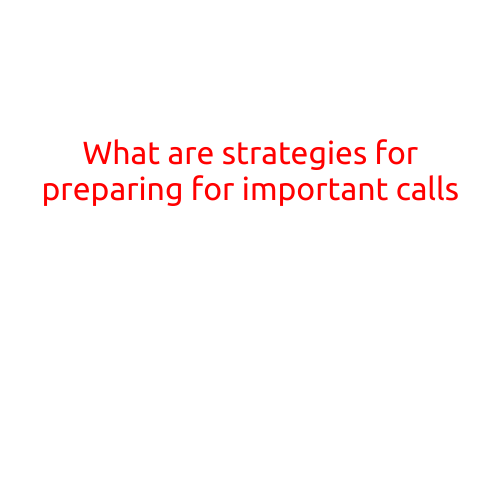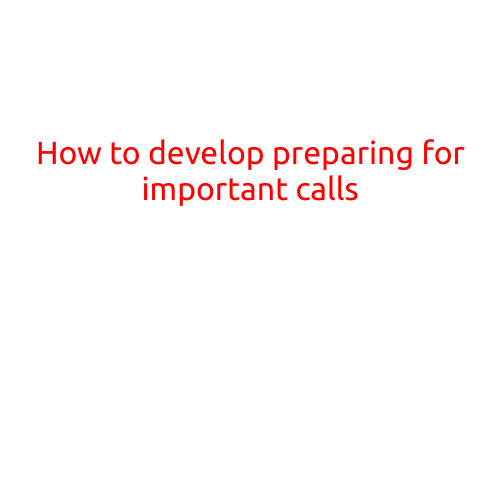
What are Strategies for Preparing for Important Calls?
In today’s fast-paced and competitive business landscape, being prepared for important calls can be the difference between landing a major deal or missing an opportunity. Whether you’re an entrepreneur, executive, or professional, making a positive impression over the phone can be crucial to building relationships, securing partnerships, and growing your business.
However, many of us struggle to prepare for these important calls, often leaving us feeling unprepared, nervous, and unsure of how to effectively communicate our message. In this article, we’ll explore some essential strategies for preparing for important calls, helping you to stay ahead of the curve and achieve your goals.
1. Research, Research, Research
Before making a call, it’s essential to do your homework. Research the person, company, or organization you’ll be speaking with to gain a deeper understanding of their needs, goals, and challenges. This will enable you to tailor your approach, highlight relevant points, and demonstrate your expertise.
2. Know Your Goal
Define what you want to achieve from the call. Is it to secure a meeting, negotiate a deal, or build a relationship? Being clear about your objectives will help you stay focused, ensure a productive conversation, and measure the call’s success.
3. Prepare a Agenda
Create a agenda for the call, outlining key points you want to discuss, questions you want to ask, and any specific goals you want to achieve. This will help you stay on track, ensure a structured conversation, and avoid any awkward silences.
4. Anticipate Questions
Think about the questions the other person might ask, and prepare responses in advance. This will help you feel more confident, avoid any last-minute scrambling, and provide a more comprehensive response.
5. Practice Your Pitch
Rehearse your pitch or key message to ensure you’re delivering it in a clear, concise, and engaging manner. Practice with colleagues, friends, or family members to get feedback and improve your delivery.
6. Be Proactive
Don’t wait for the other person to initiate conversation. Start with a strong opening, introduce yourself, and immediately highlight the value you can bring to the discussion. This will help establish your credibility, create momentum, and set the tone for the call.
7. Use Visual Aids
Prepare any necessary visual aids, such as presentation slides or data sheets, to help illustrate your points and provide additional context. This will help the other person understand your message more effectively and retain the information better.
8. Set a Framework
Establish a framework for the call, including the schedule, format, and any key decision-making milestones. This will help manage expectations, keep the conversation on track, and avoid any misunderstandings.
9. Follow Up
After the call, send a brief summary or confirmation email to the other person, reiterating any agreements, next steps, or follow-up actions. This will help keep the line of communication open, prevent any misunderstandings, and demonstrate your professionalism.
10. Reflect and Improve
Take time to reflect on the call, identifying what worked well and what could be improved. Use this feedback to refine your approach, and make adjustments as needed for future calls.
By incorporating these strategies into your preparation routine, you’ll be better equipped to handle important calls with confidence, clarity, and conviction. Whether you’re an entrepreneur, executive, or professional, these tips will help you stay ahead of the curve, achieve your goals, and build strong relationships through effective communication.





